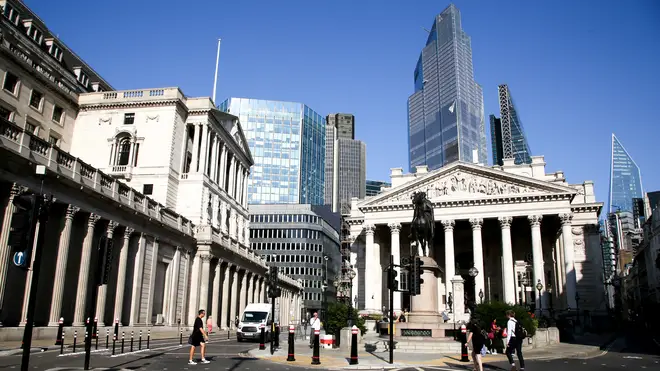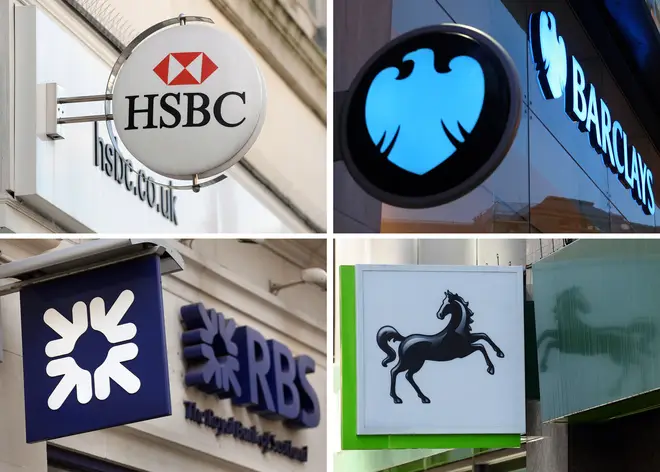
Dean Dunham 9pm - 10pm
4 February 2021, 14:26 | Updated: 4 February 2021, 18:23

The Bank of England has given lenders six months to prepare for negative interest rates being implemented for the first time in its history.
A review by the central bank's Prudential Regulation Authority (PRA) found that introducing the measure sooner "would attract increased operational risks". A move to negative interest would impact savings accounts and people's pensions.
More than 160 banks and building societies responded to the survey on whether negative lending rates would work in practice.
It comes as the Bank of England's monetary policy committee (MPC) voted unanimously to keep the interest rate at the historic low of 0.1 per cent, while quantitative easing was held at £895bn.
The committee also agreed to set the six-month notice period after policymakers made it clear they would be willing to introduce negative Bank Rates.
However, the Bank of England (BoE) "stressed that this didn’t mean negative rates were on the way".
Read more: One in five UK adults have now received Covid vaccine, Hancock says
Watch: Khan tells Londoners concerned about vaccine: 'It's safe, it's a lifesaver'

The BoE published results from the review on Thursday, which revealed how prepared the likes of Barclays, HSBC and Lloyds would be if the measure was adopted.
It said in a statement: “The PRA’s engagement with regulated firms had indicated that implementation of a negative Bank Rate over a shorter timeframe than six months would attract increased operational risks.”
The PRA also found that "any shorter implementation period could adversely impact some firms’ safety and soundness" as they would need to find short-term fixes for their IT systems.
Although the regulator advised banks to consider their preparedness for negative rates within a six-month period, the MPC warned that "such a request could be misconstrued as a signal that the MPC setting a negative Bank Rate was in prospect or even imminent".
"This was a signal that the committee did not wish to send," it added.
Read more: Harry Dunn's mum 'shocked' after court hears suspect 'worked for US intelligence'
Read more: Clergyman sorry for saying clap for Capt Tom was 'cult of white British nationalism'

It is feared that such a policy - previously practised by the central banks of Denmark, Japan, Switzerland and Europe - would lead to high street banks and building societies being forced to offer negative rates on savings accounts, including pensions.
However, the measure would also lower borrowing costs for households and businesses.
Despite previously stating in November that GDP could rise in the first quarter of 2021, the BoE knocked four per cent off that figure on Thursday, with new Covid variants and lockdown measures impacting the number.
However, the UK's swift vaccine rollout could allow some fiscal restrictions to be relaxed in the coming months, the Bank suggested.
Sarah Coles, a personal finance analyst at Hargreaves Lansdown, said: "The BoE has asked banks to get ready for negative interest rates, which will have struck fear into the hearts of millions of cautious savers.
"They’re already suffering truly dire returns from high street banks, so the thought of having to pay a bank to hold their savings is unbearable. Fortunately, it’s also unlikely."

She added: "Even if the BoE introduces negative rates, this doesn’t mean they’d be passed on into mortgage and savings rates. Most mortgages are fixed anyway and variable mortgages usually have a floor they can’t drop beneath.
"New mortgages would get cheaper but, in reality, we’d be unlikely to be paid to borrow money. In those countries where they have negative rates, some have fed through into a handful of mortgages but, because of the fees they come with, people aren’t really being paid to borrow.
"Savers, meanwhile, can take comfort from the fact that banks really don’t want to start charging us to save. They’d be worried we’d withdraw our savings and keep them under the mattress – leaving the bank short of liquidity.
"They would undoubtedly reduce rates where they could, and some might cut them to zero per cent.
"However, even if this happens – and that’s a big if – there will still be banks competing for market share and offering positive rates to those who are prepared to shop around.”